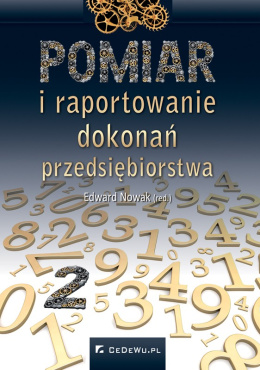-
Koszyk jest pusty
-
x

-
Koszyk jest pusty
-
x
- Kategorie
-
The Concept of a Comprehensive Approach to Knowledge Management in the Organization

During its entire history, the world has never changed as quickly as it is today. Customers' expectations, as well as widely understood conditions of doing business, are changing continuously. In consequence, the problems which the organizations must face, as well as resources, methods, and tools, which can help solve them, are undergoing constant changes. Solving these problems requires appropriate knowledge and wise management of this strategic resource. Knowledge management (KM) is a concept of the future, which is worth devoting the time and scientific effort. However, while providing a thorough analysis of the literature on knowledge management it was discovered that the majority of publications do not discuss this concept in a comprehensive manner, but focus on specific aspects or issues related to knowledge management. What is more, the author's scientific investigations conducted so far led to the conclusion, that managers know and apply some of the knowledge management tools
| Wysyłka w ciągu | 24 godziny |
| Kod kreskowy | |
| ISBN | 978-83-8102-168-5 |
| EAN | 9788381021685 |
Knowledge management (KM) is a concept of the future, which is worth devoting the time and scientific effort. However, while providing a thorough analysis of the literature on knowledge management it was discovered that the majority of publications do not discuss this concept in a comprehensive manner, but focus on specific aspects or issues related to knowledge management. What is more, the author's scientific investigations conducted so far led to the conclusion, that managers know and apply some of the knowledge management tools and initiatives in their organizations, but their decisions and actions related to KM are rather intuitive than based on knowledge of knowledge management. It was therefore considered that there is a need to develop and present a comprehensive approach to knowledge management, which gives an answer not only to the question what? but also to questions: why? and: how? one should act in order to achieve success in knowledge management.
This monograph contains a broad and insightful overview of issues related to knowledge management in the organization, thus constituting a very good compendium of information about such an important area of modern management of the organization. In an accessible, substantial and at the same time an exhaustive manner, the author presents, inter alia:
- systematized knowledge related to the concept of knowledge management in the organizations,
- original model presenting a comprehensive approach to knowledge management in the organizations,
- authorial model of knowledge management system, which enables the implementation and realization of KM in the organizations,
- practical solutions (procedures) facilitating knowledge management in the organizations.
This monograph should become a source of inspiration and ideas for further research as well as be a source of knowledge for students of economics faculties. With regard to implementation, it should interest entrepreneurs and managers who want to increase the effectiveness and competitiveness of their organizations.
Introduction 7
Chapter 1. Knowledge management - introductory issues 14
1.1. Knowledge as a subject matter of management 14
1.2. The essence of knowledge management 22
1.3. Goals and benefits of knowledge management 25
1.4. Approaches and models of knowledge management 29
1.5. Aspects, functions and assignments of knowledge management 35
1.6. Factors and barriers to knowledge management 39
Chapter 2. Knowledge management processes 42
2.1. Knowledge localization and presentation 43
2.2. Knowledge acquisition 47
2.3. Knowledge development 49
2.4. Knowledge sharing and dissemination 51
2.5. Knowledge using 55
2.6. Knowledge preservation 58
Chapter 3. Creation and implementation of knowledge management strategy 62
3.1. Strategies of knowledge management 62
3.2. Knowledge management implementation 66
3.3. Knowledge management measurement 71
Chapter 4. Personal, cultural and technological dimensions of knowledge management 77
4.1. Management of knowledge workers 78
4.2. Personal knowledge management 88
4.3. Organizational culture vs. knowledge management 94
4.4. Knowledge management technologies 105
Chapter 5. Knowledge management in the organizations in the light of the research 110
5.1. The objective of the study and research problems 110
5.2. The respondents' opinion on knowledge management 113
5.3. The respondents' opinion on the state of knowledge management in the organizations 121
5.4. The conclusions of the research 136
Chapter 6. The model of a comprehensive approach to knowledge management 142
6.1. Building awareness of the role of knowledge management 142
6.2. Strategic knowledge management 146
6.2.1. Assumptions of the model 146
6.2.2. Knowledge strategy creation 149
6.2.3. Knowledge management strategy creation 153
6.3. Tactical and operational knowledge management 156
6.4. Conclusions 159
Chapter 7. The complex model of the knowledge management system 164
7.1. Assumptions of the model of the knowledge management system 164
7.2. Structure of the model of the knowledge management system 171
7.3. Environment of the knowledge management system 178
7.4. Conclusions 183
Chapter 8. Practical knowledge management in the organization 186
8.1. Human dimension of knowledge management 186
8.2. Cultural dimension of knowledge management 190
8.3. Technological dimension of knowledge management 195
8.4. Processes of knowledge management 198
8.5. Measurement of knowledge management 206
8.6. Knowledge management vs. environmental changes 209
Final recommendations 212
Literature 219
Tables 231
Figures 232
Appendix 1. Knowledge management in the organization 233
Appendix 2. Characteristics of the surveyed population 239
Polub nas na Facebooku








